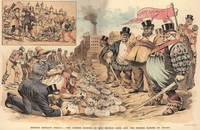The Federal Communications Commission is seeking to shut the door on a plan by a group of Silicon Valley entrepreneurs to offer free wireless broadband Internet service everywhere in the U.S., the chief executive of the group said Wednesday.Why would the FCC object to that? Continue readingM2Z Networks Inc. issued a statement Wednesday in which it said it would take the FCC to court in an attempt to force the agency to conduct a thorough analysis of the plan before it determined whether it would back it or not.
The company has proposed taking 25 megahertz of spectrum that is currently vacant and using it to build a wireless broadband Internet network to provide free service to 95% of Americans within a decade.
— UPDATE: FCC Opposes Silicon Valley VCs’ Free-Broadband Plan, (Updates with comment from Rep. Anna Eshoo, D-Cal., in the fifth paragraph.) By Corey Boles, Dow Jones, August 15, 2007: 05:14 PM EST
Category Archives: Politics
Universal Slush Fund
 The regulatorium in action:
The regulatorium in action:
A decade-old telephone tax intended to help bring affordable service to rural areas has instead turned into something quite different: a bottomless and politically protected well of cash for cell phone companies that do big business in rural America.The article goes on to say wireless telephone companies benefit the most because they can connect rural customers at much less cost than landline telcos can. But that’s not all. Continue readingOver the past four years, there’s been nearly a tenfold increase in government subsidies paid to a handful of so-called “competitive” providers — cellular phone companies paid by the fund to offer service in rural areas where an existing carrier already receives a subsidy.
The Universal Service Fund has collected $44 billion over its 10-year lifetime from a surcharge on the phone bills of nearly every American.
Regulators and lawmakers have long viewed the fund as inherently flawed. Even a member of the federalstate board that runs the program calls it “bizarre.” But efforts to change it have been derailed repeatedly by companies that benefit from the largess, and by supporters in Congress who represent sparsely populated states.
— Federal fee on phones is windfall for cell firms, By John Dunbar, ASSOCIATED PRESS, Updated: 07/29/07 6:37 AM
Crack Google?
 Cringely gets anxious over
Google’s floor bid for 700Mhz.
After pointing out that Verizon and AT&T coming around
to Kevin Martin’s leaked counterproposal of watered down
“open access” rules, he says:
Cringely gets anxious over
Google’s floor bid for 700Mhz.
After pointing out that Verizon and AT&T coming around
to Kevin Martin’s leaked counterproposal of watered down
“open access” rules, he says:
Look who Google is up against — all the largest Internet service providers in the U.S. Google will not win this even if they win the auction, because the telcos and cable companies are far more skilled and cunning when it comes to lobbying and controlling politicians than Google can ever hope to be. The telcos have spent more than a century at this game and Google hasn’t even been in it for a decade. And Google’s pockets are no deeper than those of the other potential bidders.Cringely is missing the point about who Google is up against. These outfits have not been the largest ISPs for more than a century. They’ve been telephone companies for more than a century. And being around for a long time isn’t necessarily a sure win. Look at the Vatican; it’s been around for two thousand years, and it’s managed to lose most of its traditional heartland of Europe. Sure, Google is fragile, in some senses even more fragile than Microsoft, as Cringely points out. But even Microsoft is losing market share from IE to an open source browser, Firefox. Google, as a proponent of open source that actually understands it, has a fair chance here. The incumbent duopoly telcos aren’t really in the Internet business; Google is.— Is Google on Crack?: Eric Schmidt bets the ranch on wireless spectrum, Robert X. Cringely, Pulpit, 27 July 2007
Maybe Cringely’s right that Google alone couldn’t win the auction. But Google and Sprint possibly could. Sure, Sprint is a phone company, too. But that doesn’t mean it’s going to side with the rest if it scents profit. Maybe with a little help from Apple.
Let’s hope that’s what Google is really up to, rather than expecting to get Martin to change the rules and then wait for AT&T to deliver another striped bass.
I also don’t think Cringely is taking into account the stakes here. Continue reading
The Internet As a Market: Al Gore and Reasoned Discourse
 So I’ve been wondering what to say about Al Gore’s book,
The Assault on Reason.
A story in The Economist helped me out.
After lauding Gore for calling Mr. Bush’s risky schemes
well before most people, for denouncing the invasion of Iraq
back in 2002, for his Oscar, and for being “the man who changed the climate
of opinion climate change”,
it then ridicules the book’s core thesis:
So I’ve been wondering what to say about Al Gore’s book,
The Assault on Reason.
A story in The Economist helped me out.
After lauding Gore for calling Mr. Bush’s risky schemes
well before most people, for denouncing the invasion of Iraq
back in 2002, for his Oscar, and for being “the man who changed the climate
of opinion climate change”,
it then ridicules the book’s core thesis:
But he does not stop there. He worries about America’s money-saturated politics. He lambasts television for infantilising the electorate.That last would appear to be the sort of trivialized, perhaps even infantilized, reaction Gore is lamenting. The big advantage of the Internet is you get not just a few zealots at extreme ends of an arbitrary spectrum: you get all the shadings and colors and depth you can absorb. And you can weave your own strands in this home-made tapestry. Continue reading…
He sometimes comes across as eccentric—as when he lambasts television for killing public discourse, then celebrates the internet as its potential saviour. A few minutes online, reading the zealots on either the right or the left, should have been enough to explode that illusion.
— Gore in the balance, From The Economist print edition, May 31st 2007
AT&T’s Striped Bass
 You may recall that
the FCC at the last minute in 2006,
after the elections and before the electees took office,
agreed to some conditions on the merger of Bellsouth with AT&T.
Among them was a $10/month DSL plan.
You may recall that
the FCC at the last minute in 2006,
after the elections and before the electees took office,
agreed to some conditions on the merger of Bellsouth with AT&T.
Among them was a $10/month DSL plan.
The merger commitment specifies that the plan had to be offered. That means to me that it has to be put forth as an option!!! (If there’s a fifty pound striped bass somewhere out there in the ocean, that’s not an offer of fish!)This is the same $10/month service USA Today announced AT&T was developing back in January. Maybe they’ll just keep “developing” it until the 48 month time limit expires, or make it available to a few people and claim they’ve honored their commitment.This is what SBC used to do: claim availability if one person per ZIP code could get a service, and the FCC let them get away with that.So I don’t think AT&T is honoring its $10/month commitment.
— Is AT&T Honoring its Merger Commitments? David Isenberg, isen.blog, Friday, July 06, 2007
Isenberg asks:
Do you think the FCC will investigate?Continue reading
The Tree of Liberty
 On this day in the United States we celebrate the
Declaration of Independence with
On this day in the United States we celebrate the
Declaration of Independence with
Pomp and Parade, with Shews, Games, Sports, Guns, Bells, Bonfire and Illuminationsas John Adams recommended in 1776.
The Declaration laid out a “a long train of abuses and usurpations” and referred to “certain unalienable Rights”, which the former colonials went on to spell out in a written Constitution (the oldest in the world today) to which they added a Bill of Rights. Is their work done? Continue reading
Dead Air
If you’re accustomed to listening to streaming Internet radio or streaming music services such as Pandora, you may be surprised to discover that when you tune into your favorite streams today you’re greeted with silence. Many Internet broadcasters—including Yahoo!, Rhapsody, Live365 stations, MTV Online, AccuRadio, and KCRW (a popular public radio station in Santa Monica, CA)—have gone silent today in a Day of Silence protest over a change in the way they’ll be charged for their services. This change, which will levy fees based on the number of listeners tuned into a particular song rather than on a percent of the broadcaster’s revenue (as was the model in the past), will likely put most Internet broadcasters out of business.It’s sad that the music industry as we previously knew it is dying, but nuking Internet distribution of music isn’t going to solve that problem, which the record industry largely brought on itself. Continue reading— Day of Silence, By Christopher Breen, Playlist, 26 June 2007
Internet Deconstructs Spin?
 Joe Trippi thinks the Internet changes politics from spin to something better:
Joe Trippi thinks the Internet changes politics from spin to something better:
Internet activism is spelling the end for the age of spin, the online campaign guru Joe Trippi will warned two British politicians, suggesting that the rules for dealing with “old media” no longer apply.Dave Weinberger suggests more or less the same thing, somewhat less optimistically, Continue reading…
“Command and control … [is] a disaster in the peer-to-peer social network world.”
— Does the Internet Spell the End of Political Spin? By Tania Branigan, The Guardian. Posted June 15, 2007.
U.S. Presidential Candidates per WCA
…the authoritative go-to resource for comments by – and comparisons between – top U.S. policymakers regarding the pace and benefits of broadband deployments. The ongoing U.S. Presidential election campaign already features the policy positions of the candidates. Broadband services play a vital role in a host of areas in both the North American and world economies. These much-sought benefits go beyond consumer desires to include community economic development in rural and urban regions, plus critical applications in education, public safety, military preparedness and disaster response.It’s somewhat unfortunate that it’s phrased as Broadband, not Internet policy, but given the membership of WCA, that’s understandable. I can’t tell at first glance how thorough it is. They ask for comments.— WCA Thought-Leaders Forum: U.S. Presidential Candidates Debate Broadband, accessed 13 June 2007
-jsq
None Should Be Favored
 What’s the theory behind
the recent postal rate changes?
The Chairman of the Postal Board of Governors spelled it out 27 years ago:
What’s the theory behind
the recent postal rate changes?
The Chairman of the Postal Board of Governors spelled it out 27 years ago:
“…none should be favored and none benefited. Each party pays the cost of service it consumes, not less, and does not bear the cost of others’ consumption.”And the Postal Regulatory Commission is following that theory. Continue reading— James C. Miller III and Roger Sherman, “Has the 1970 Act Been Fair to Mailers?” in Roger Sherman, ed., Perspectives on Postal Service Issues 63 (1980).